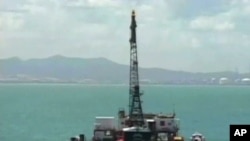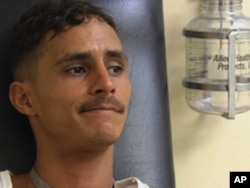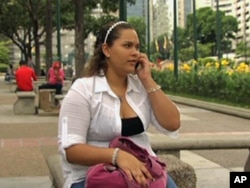Hillside slums of ramshackle homes and narrow alleyways ring Caracas. Cauldrons of desperation and lawlessness, these are tough neighborhoods where Venezuelan President Hugo Chavez draws a base of support.
President Chavez has invested heavily to improve these communities, and recently came to the 23 de Enero neighborhood to inspect homes renovated with state funds.
Here, oil money flows directly. President Chavez ordered the state oil company, PDVSA, to build and operate a massive social services center.
At the medical clinic, Miguel, a 23-year-old painter, is treated for gastritis. "I do not have to pay anything. Everything here is free for the public. This should continue. I hope it does, because we will improve Venezuela," he said.
And who does he thank for his treatment? "President Chavez. President Hugo Chavez has done all this, with the revolution," he said.
In a workshop next door, people make clothes worn by PDVSA employees and Chavez-backers. Many who toil here are in their 50s and 60s, and say they would never get a job, let alone a living wage, in the private sector.
"Even though we are elderly, we are here working. This would be impossible anywhere else, impossible if this were a private operation," said one sewing lady.
Elsewhere in Caracas, oil revenue bankrolled a new cable car service for a hillside community. In another neighborhood, residents like Jose Rodriguez point to a free dental clinic and a basketball court. "Many people ask: where is the oil money going? Well, I have seen some of it going to work right here in my community," he said.
But not everyone is thrilled. Across town from 23 de Enero, in one of Caracas' more well-to-do neighborhoods, medical student Claudia Perez accuses President Chavez of pampering his supporters at the expense of everyone else. "He only takes care of those who support him and his government, not those who have a different point of view," she said.
And, she says, the Chavez program is short-sighted. "Oil cannot be everything. One day it will run out. And we are doing nothing to generate other forms of wealth," she said.
President Chavez boasts his country has enough oil to last the next 100 years. And he could be right.
New geological surveys show Venezuela's oil reserves dwarfing those of Saudi Arabia. But having oil is one thing; maintaining a state-owned oil industry and using revenue wisely are another, says Venezuelan oil analyst Juan Carlos Sosa.
"Since almost all the oil revenue PDVSA receives are used for non-petroleum purposes, PDVSA cannot maintain the wells and keep them running. It does not have the funds, so it has to close the wells. And since foreign companies are given no incentive to invest in oil operations, production is paralyzed," he said.
Venezuela's oil production has plummeted by a third under Chavez, according to Sosa.
He blames PDVSA's social programs that are so popular among the poor. "Instead of staying on top of oil production and international sales, PDVSA's president has to worry about a thousand other things. And nothing is done well," he said.
And by doling out money in direct assistance rather than focusing on long-term development, President Chavez is masking poverty rather than curing it, according to economist Orlando Ochoa of Venezuela's Catholic University. "Oil wealth can be used to transform and improve the economic base of a country, as has been done in Norway. Or, it can be used to compensate for economic imbalances, thereby prolonging the pain, as has been done in Venezuela and Iran," he said.
But President Chavez makes no apologies for the way he is spending Venezuela's oil revenue. "We are building hospitals, universities, housing, highways, railroads, public works projects like water distribution. And all of this costs money," he said.
And that money depends not only on petroleum production, but also on global oil prices, over which President Chavez has no control.






